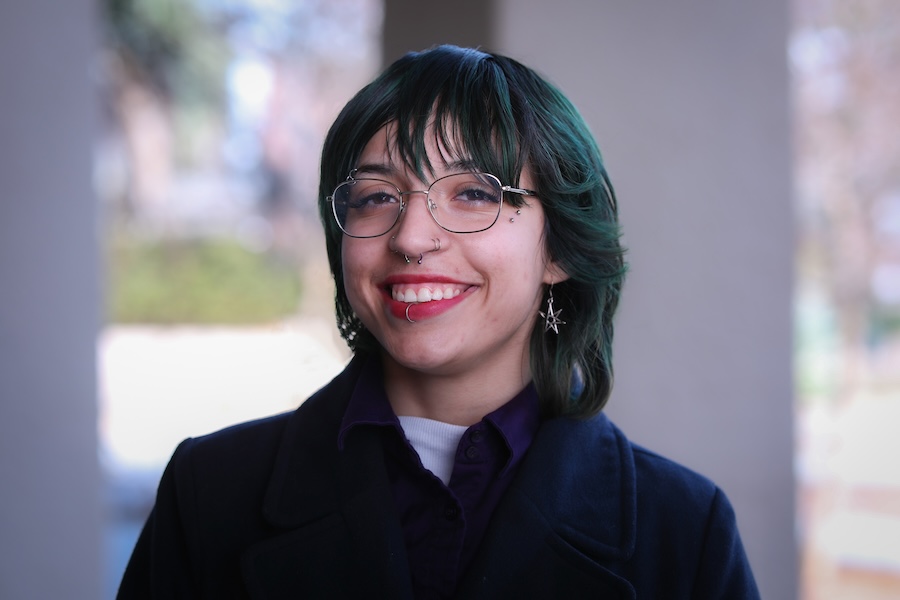Student Spotlight: Ana Pereira

Ana Pereira is a third year undergraduate in the Department of Physics, part of Florida State University’s College of Arts and Sciences. While at FSU, Pereira has researched induced fission, a unique type of radioactive decay leading to a large energy release and has presented findings at FSU's 2024 Undergraduate Research Symposium. Through FSU’s Academic Center for Excellence, Pereira has tutored more than 200 students, and currently serves as a member in FSU’s Chapter of the Florida Georgia Louis Stokes Alliance for Minority Participation.
Tell us a little about your background and what brought you to FSU.
I was born and raised in Miami, Florida, and I am a proud first-generation Brazilian-American. I loved studying math and science throughout middle and high school, and I always knew I wanted to be a scientist. I was drawn to FSU because of its nationally renowned science programs. The science departments provide students with a variety of resources to assist them academically and professionally.
What inspired you to pursue an education in physics?
I took my first FSU physics course with teaching faculty member Yuko Hori and was enthralled by her class. Not only was I interested in the subject matter, but I was inspired to pursue an education in physics. Ultimately, I am drawn to physics because of its ability to explain all types of science at a fundamental level.
What is something that you’ve found unique about FSU’s Department of Physics?
FSU’s Department of Physics celebrates collaboration, specifically during its weekly colloquiums. During these colloquiums, we learn from presenters researching many different physics disciplines. The meetings are open to undergraduate and graduate students, postdocs, and faculty, bringing together physicists on campus and from the National High Magnetic Field Laboratory. The department routinely provides a space for students to exchange knowledge with industry professionals, which is a testament to its innovation focus.
Have you participated in any research within the Department of Physics?
I am currently conducting research at the John D. Fox Superconducting Linear Accelerator Laboratory with assistant professor Vandana Tripathi, an experimental nuclear physicist. My project explores induced fission, the splitting of an atom’s nucleus into two nuclei and gamma rays as a result of an incident projectile. I am studying the relationship between different properties of the fragments using gamma-ray spectroscopy. As a case study, I am analyzing data collected at FSU's gamma array that measured the gamma rays released during the fission of 209-Bismuth, a stable isotope, induced by an energetic beam of 14-C atoms. I completed this research project throughout Fall 2023 and Spring 2024. I will continue to work under professor Tripathi throughout Summer 2024 and my senior year, studying the spontaneous fission of 252-Californium through gamma ray analysis also. I plan on pursuing an honors in the major thesis using this work.
Are there any faculty and/or staff that have inspired you?
As an instructor, Hori played an integral role in my decision to study physics. She inspired me to pursue an undergraduate education in physics and to later attend graduate school for physics, chemistry, materials, or whatever I wanted! She enlightened me to opportunities an undergraduate physics degree could provide. I have also been inspired by professor Tripathi through my research project. She is a fantastic mentor who is driven to help students succeed. I am fortunate to meet with her weekly to discuss my research progress and set goals for the next meeting. Overall, I have had a wonderful experience with FSU physics faculty.
What is something people don’t know about studying a discipline in physics?
Studying physics requires courage. Understanding physics is challenging, and I have learned that the way to learn is to practice. Physics problems can be time-consuming, and I have to trust myself at every step to solve a problem. Physics is beautifully organized, so I am learning the science by building my intuition.
What are some current projects you're working on?
I just submitted my application to the Barry Goldwater Scholarship and Excellence in Education Foundation, which is an extremely competitive research scholarship. I worked hard on this application over several months and am proud of it. I am also in the process of applying for an IDEA Grant to help fund my work this summer.
Last summer, I was a science undergraduate laboratory intern at Brookhaven National Laboratory’s National Nuclear Data Center and had the privilege of working with my mentors, theoretical physicist Emanuel Chimanski and technical engineer Donnie Mason, on a theoretical physics project implementing machine learning to predict the probability of gamma-ray emissions. My mentors are extremely supportive, and I plan to continue collaborating with them to further develop our findings. Similar to my research at FSU, this project also focuses on gamma rays, so I will also discuss this project for my honors in the major thesis and identify how these projects are complementary.
What aspect of your area of study do you find most rewarding?
It is incredibly rewarding to travel and present research at national conferences. So far, I have presented twice at the American Physical Society Conference for Gender Minorities in Physics, once at the National Diversity in STEM Conference, and once at the American Physical Society Division of Nuclear Physics Conference. I have been awarded travel grants for all these experiences — attending these events has been a privilege. While at conferences, I attended workshops, networked with fellow aspiring scientists, and met scientists from academic institutions, national laboratories and various industries.
Following your graduation, what are your plans? Even though you might miss FSU, what are you looking forward to once you graduate?
Upon my expected graduation in Spring 2025, my goal is to get my doctorate in physics at a university with a collaborative nuclear physics program. I am also looking forward to doing more independent research and one day becoming a professor at a research university. I want to give back to my field by mentoring students towards success.
